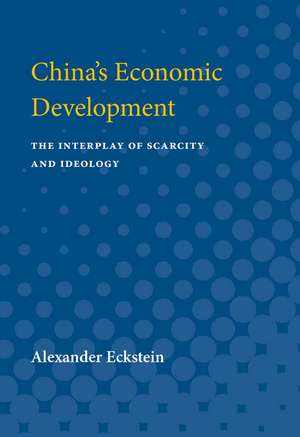China's Economic Development: The Interplay of Scarcity and Ideology: Michigan Studies On China
Autor Alexander Ecksteinen Limba Engleză Paperback – 31 dec 1974
In this book, Alexander Eckstein turns his years of research and investigation to the task of exploring one of the most significant economic developments of the twentieth century: China's task of modernization and industrialization in the context of a socialist system. Eckstein asserts that China's economic development since 1949 can be best understood by centering it on the continuous confrontation of the country's Communist Ideology with its often harsh economic realities. Through analysis of this conflict, the tensions and its products, one might better understand how other countries might struggle—and whether they succeed or not—in developing as well. China's Economic Development is divided into six parts. Part I provides an overview of China's development problems, policies, and performance during the 1950’s and 60’s. Part II develops a framework for the analysis of scarcity and ideology, while Part III probes into China's economic heritage. Parts IV and V examine in turn the interplay of scarcity and ideology in conditioning China's development strategies, patterns of economic growth, and economic fluctuations since 1949.
Preț: 370.10 lei
Nou
Puncte Express: 555
Preț estimativ în valută:
70.82€ • 74.09$ • 58.83£
70.82€ • 74.09$ • 58.83£
Carte tipărită la comandă
Livrare economică 02-16 aprilie
Preluare comenzi: 021 569.72.76
Specificații
ISBN-13: 9780472083107
ISBN-10: 0472083104
Pagini: 416
Ilustrații: 35 tables, 4 illustrations
Dimensiuni: 152 x 229 x 191 mm
Greutate: 0.61 kg
Editura: UNIVERSITY OF MICHIGAN PRESS
Colecția University of Michigan Press
Seria Michigan Studies On China
ISBN-10: 0472083104
Pagini: 416
Ilustrații: 35 tables, 4 illustrations
Dimensiuni: 152 x 229 x 191 mm
Greutate: 0.61 kg
Editura: UNIVERSITY OF MICHIGAN PRESS
Colecția University of Michigan Press
Seria Michigan Studies On China
Descriere
A study of China's economic development in light of political and social objectives
